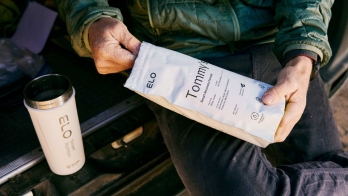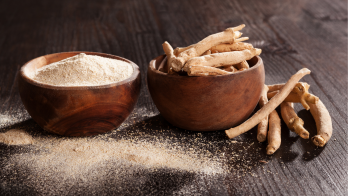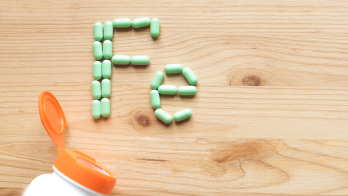The best muscle recovery supplements, according to science
If you’re looking to level up your recovery, supplementation may be the way to go. From ashwagandha to tart cherry juice extract, here’s what science has to say about the best muscle recovery supplements.

Studies continue to show that regular physical activity is one of the best things you can do for your health. Even though exercise has a plethora of benefits, experts argue that post-workout recovery is just as important as the workout itself.
While you can enhance recovery with certain foods, stretches, and rest days, what you choose to supplement with can also play a factor. Yet, with so many options available on the market today, it begs the question: do muscle recovery supplements work?
Science says yes….with a few caveats. Before diving into the research on muscle recovery supplements, let’s first understand why muscle recovery is important and why you should make it part of your workout routine.
Why is muscle recovery important?
Muscle recovery is important for muscle growth, performance, and decreased risk of injury because it helps to replenish energy and repair muscle tissue that is broken down during exercise.
Studies have found that if you ignore recovery or don’t get adequate rest, you can experience a decrease in performance, increase your risk of injury, and prolong muscle soreness and pain [
,2
,3
].How to speed up muscle strain recovery
Getting back to exercise too soon after straining a muscle can prolong or even worsen the injury. You can speed up muscle strain recovery by giving your body adequate rest days and trying certain muscle recovery supplements.
Do muscle recovery supplements work?
Yes, there is some evidence to suggest that muscle recovery supplements work. However, their effectiveness can vary depending on factors like age, gender, activity level, goals, and the specific supplement in question.
Disclaimer: Supplements are not created equal, and may not be recommended for everyone. To see if a supplement is right for you, talk with your healthcare provider before adding anything new into your routine.

Find the best muscle recovery supplements with Elo Health
With so many muscle recovery supplements on the market, how do you know which ones are best for you and your goals? There’s no need to worry–at Elo, we’ve dug into the science to determine the best supplements for muscle recovery that will help you reach your goals.
made just for you and your needs. We also offer1:1 dietitian support with our Elo Health coaches
so you can stay accountable, reach your health and fitness goals, and better understand your health.Start your personalized supplement journey today!
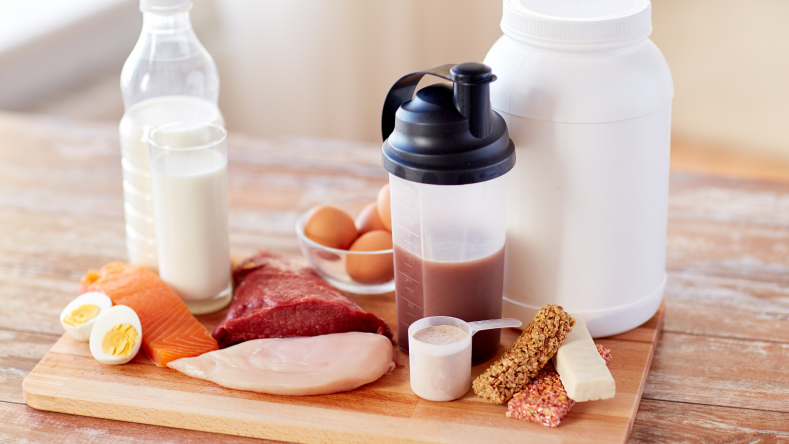
Protein
Protein is an essential macronutrient that plays a vital role in strength, lean muscle mass, post-workout recovery, and satiety [
,5
].While you can get protein through numerous dietary sources, protein powders are a popular supplement for muscle recovery. Research shows that drinking a protein shake before or after a workout can increase physical performance, recovery, lean body mass, muscle hypertrophy, and strength [
]..
Dosing recommendations
The current RDA is 0.8 g/kg/day for all adults over 18 years of age, including elderly adults over the age of 65 [
]. However, studies also indicate that people over 65 years old can consume between 1 to 1.2 g protein/kg of body weight/day [8
].If you are an athlete or highly active individual, research shows that you may need 1.2-2.0 g/kg of body weight/day, depending on training needs and goals [
]. Experts also suggest that 1.2-1.7 g of protein/kg of body weight/day can be beneficial to increase muscle mass [10
].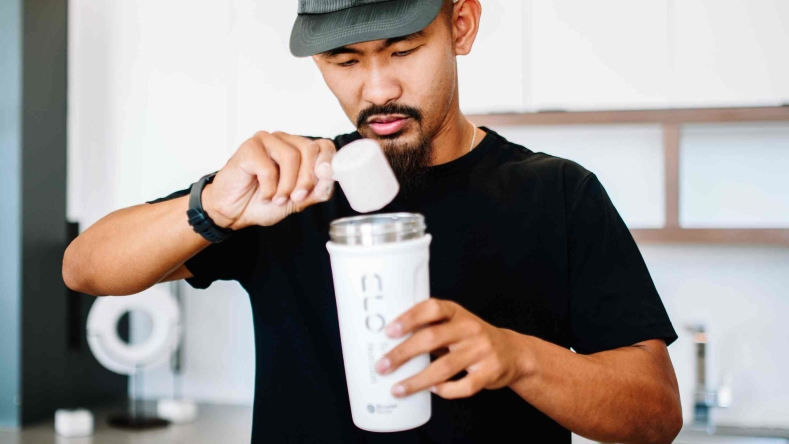
Elo Health and post-workout recovery
is a personalized protein powder that is designed for anyone who wants to boost recovery and enhance performance. Unlike other custom protein products, Elo Smart Recovery uses your goals, health history, workout data, and dietary preferences to craft the right protein blend for you and provide specific protein dosing recommendations after every workout.Elo Smart Protein is also backed by the latest science to help you recover faster and get the most out of every scoop of protein powder.
!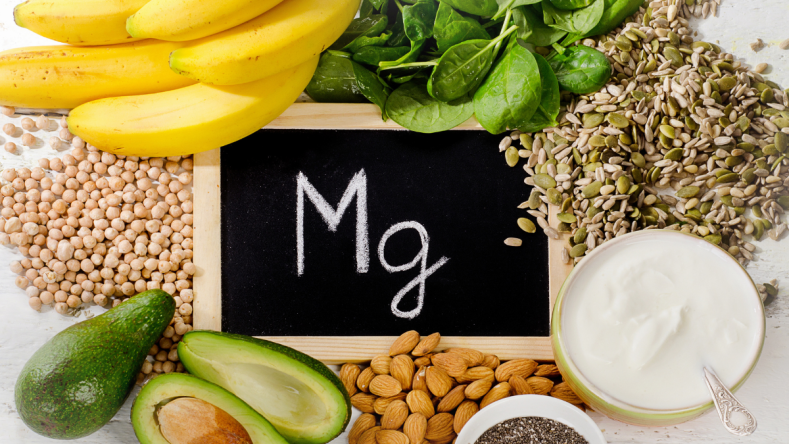
Magnesium
is a mineral that plays many critical roles in the body, including protein synthesis, bone health, energy production, disease prevention, and heart and nerve function [11
]. It also supports healthy muscle function, contraction, and relaxation, as well as enhanced recovery of blood glucose and muscle soreness, all of which are vital for post-workout recovery [12
].Moreover, research suggests that magnesium can boost exercise performance by increasing strength and power and improving rotation, jumping, and extension [
].Dosing recommendations
Magnesium needs vary by age and gender. Here is the recommended dietary allowance (RDA) for magnesium [
]:Males 14-18 years: 410 mg/day
Males 19–30 years: 400 mg/day
Males 31+ years: 420 mg/day
Females 14-18 years: 360 mg/day (400 mg/day during pregnancy)
Females 19–30 years: 310 mg/day (350 mg/day during pregnancy)
Females 31+ years: 320 mg/day (360 mg/day during pregnancy)
It’s estimated that 60% of adults do not meet the RDA for magnesium, which is easily depleted by stress and sweat [
].The standard adult dosage for supplemental magnesium is 250–450 mg/day. However, the Tolerable Upper Intake Level for elemental magnesium is 350 mg/day, as this was the highest dose determined not to cause diarrhea. Taking magnesium supplements with food may reduce your chance of experiencing digestive upset. [
Precautions
Magnesium supplementation isn’t right for everyone, as supplements may interact with certain medicines (including diuretics, heart medicines, and some antibiotics) and could cause negative issues if you have diabetes, or kidney, heart, or intestinal disease [
].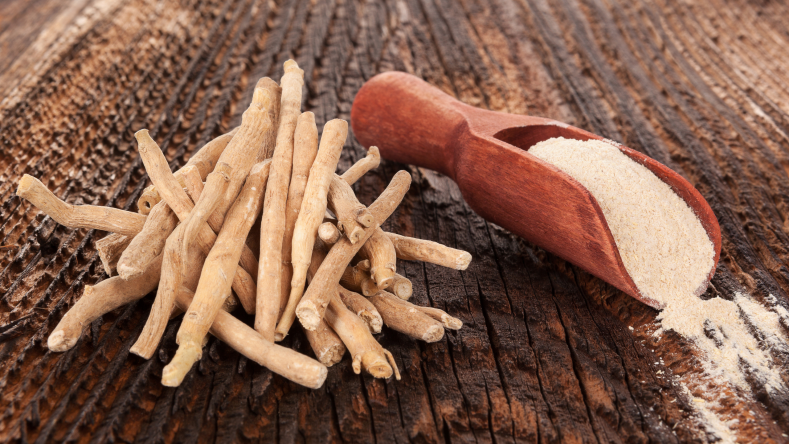
Ashwagandha
(Withania somnifera) is an evergreen shrub native to India and Southeast Asia and a commonly used medicinal herb in Ayurvedic medicine.Ashwagandha has numerous health benefits and may be beneficial for reducing blood sugar, cholesterol, and inflammation and enhancing sleep, immunity, memory, and brain function.
It can also be beneficial for sports performance and muscle recovery. Studies have found that people who took ashwagandha supplements experienced more rapid recovery from muscle damage and improved physical performance compared to those who took a placebo [
,18
,19
].Dosing recommendations
Evidence suggests that 600–1,000 mg/day of ashwagandha may be beneficial for athletes seeking performance benefits [
].Precautions
While ashwagandha has many benefits, it’s not recommended for everyone. If you are pregnant, breastfeeding, have a thyroid condition or autoimmune disease, or if you’re taking certain medications (like immunosuppressants, sedatives, diabetes drugs, or blood pressure reducers), you should avoid taking ashwagandha, as it can have adverse and potentially dangerous side effects.
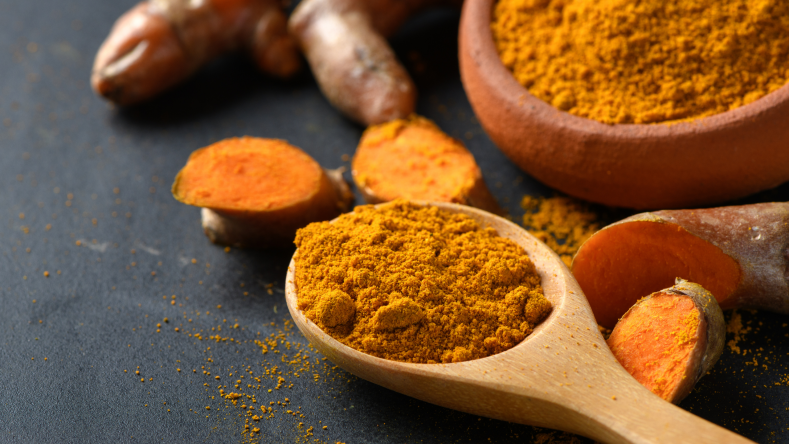
Turmeric and curcumin
is a bright yellow spice made from the root of the Curcuma longa plant. Curcumin is a naturally occurring compound in turmeric that gives this spice its bright yellow color and potent anti-inflammatory properties.Since curcumin has strong anti-inflammatory properties, evidence suggests curcumin can alleviate symptoms of arthritis, depression, and inflammatory digestive disorders, as well as pain and inflammation [
]. Furthermore, research shows that it may reduce muscle soreness and improve post-exercise recovery [22
].Dosing recommendations
Several studies have demonstrated that 400 - 2,000 mg of curcumin per day can reduce muscle soreness and inflammation after exercise [
].Precautions
It’s strongly advised to avoid turmeric supplements if you are pregnant, breastfeeding, have certain conditions (like diabetes, gallstones, gallbladder or kidney disease, bleeding disorders, or immunity problems), have an upcoming surgery, or are taking certain medications [
].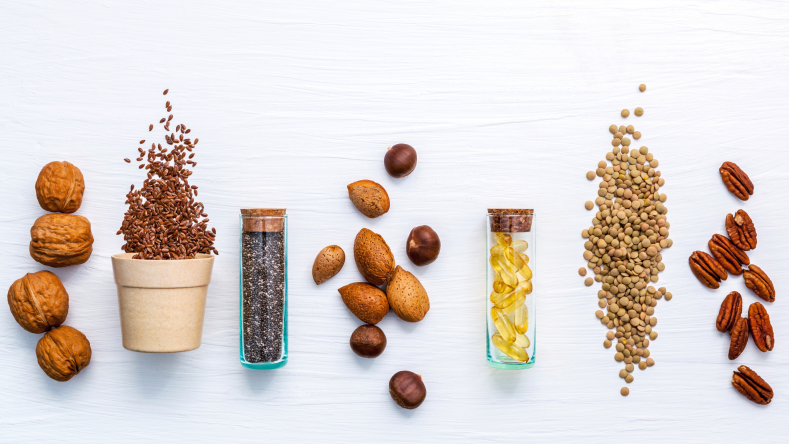
Omega-3 fatty acids
Healthy fats (like omega-3s, mono- and polyunsaturated fats) have been shown to enhance satiety, improve total cholesterol levels, boost brain health, and may reduce the risk of developing certain brain disorders [
,26
,27
].While they are important for many aspects of health, omega-3s can also greatly benefit post-workout recovery, as they may lower inflammation, reduce muscle fatigue and soreness, boost performance, and help your body repair and build muscle [
].One study found that people who took omega-3s experienced significant decreases in muscle soreness compared to those who didn’t [
]. Other research shows that omega-3 supplementation may improve muscle flexibility, lower peak heart rate, and reduce resting heart rate variability [30
].Dosing recommendations
While there are no specific daily guidelines for fatty acids, studies have found that 6 g/day (2,400 mg/day EPA and 1,800 mg/day DHA) may be beneficial in boosting recovery and reducing muscle soreness [
].Precautions
If you have high triglycerides, it may be best to avoid omega-3 supplements, as they have been associated with an increased likelihood of developing atrial fibrillation [
].
CoQ10
Coenzyme Q-10 (CoQ10 or Ubiquinone) is a lipid antioxidant essential for body tissues and organ health. It helps prevent the generation of free radicals and modifications of proteins, lipids, and DNA [
] and may also benefit recovery by reducing inflammation and alleviating fatigue [34
,35
].Dosing recommendations
Standard CoQ10 doses range from 60-500 mg/day; however, studies indicate that it can be well-tolerated at higher doses of 1,200-2,400 mg/day [
].Other research suggests that taking 60-100 mg/day of CoQ10 supplements may improve aerobic power, anaerobic threshold, exercise performance, and/or post-workout recovery [
].Precautions
CoQ10 is generally well-tolerated; however, some people may experience side effects such as allergic reactions, stomach upset, loss of appetite, nausea, vomiting, and diarrhea. It might also lower blood pressure, so it’s best to talk with a healthcare professional before taking it [
].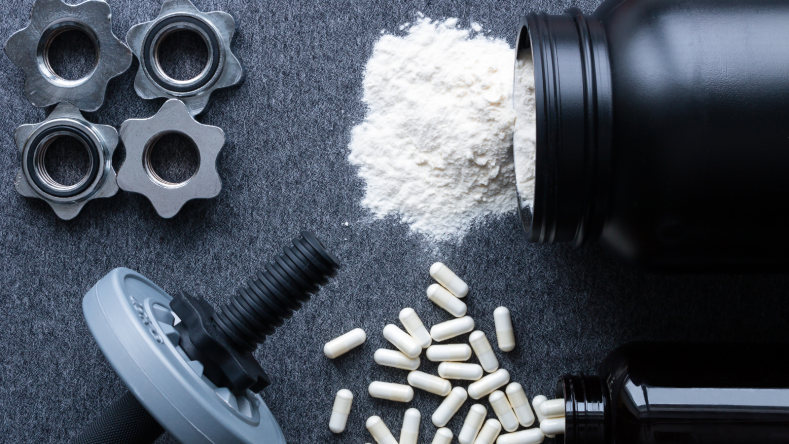
Creatine
is a naturally occurring compound made of amino acids (such as L-arginine, glycine, and L-methionine). It supplies energy to your muscles to aid growth, strength, and performance [39
]. As such, some research suggests that creatine supplements might aid muscle recovery since creatine supplementation can produce greater muscle strength after exercise-induced muscle damage [40
].Dosing recommendations
Research shows that 0.3 g of creatine/kg of body weight/day for 3–5 consecutive days or 20 g/day for 5–7 successive days has been shown to quickly increase intramuscular creatine, yielding immediate ergogenic benefits. Additionally, 3–5 g of creatine/day over 4 weeks may increase creatine stores, improve muscle performance, and enhance recovery [
].Experts recommend creatine supplementation for people looking to elevate their fitness training as long as they consume a well-balanced diet and don’t exceed recommended dosages [
].BCAAs
Branched-chain amino acids (otherwise known as BCAAs) include three essential amino acids necessary for muscle recovery and growth –valine, leucine, and isoleucine.
Studies show that BCAAs can reduce muscle damage and soreness that result from strain and inflammation caused by exercise [
]. Other notable research indicates that BCAAs may promote muscle building after exercise since they stimulate protein synthesis and suppress muscle protein breakdown [44
,45
,46
].Dosing recommendations
BCAAs are likely safe at 12 g/day, but experts suggest taking up to 20 g/day in divided doses for muscle enhancement [
,48
].Precautions
BCAAs might cause some side effects, such as fatigue and loss of coordination, nausea, diarrhea, or bloating [
].If you are pregnant or breastfeeding, or have ALS, Lou Gehrig disease, branched-chain ketoaciduria, or diabetes, it’s strongly recommended NOT to take BCAAs [
].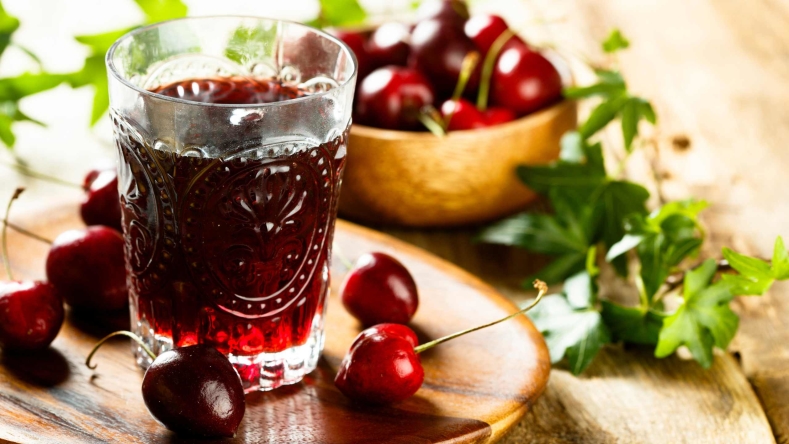
Tart cherry juice extract
Tart cherry juice (made from the fruit of the Prunus cerasus tree) is a rich source of antioxidants, nutrients, and beneficial plant compounds. It has also been found to help minimize inflammation, post-exercise muscle pain, and muscle soreness [
].Studies suggest that tart cherry juice extract may aid recovery by increasing total antioxidative capacity, reducing lipid peroxidation and enhancing the recovery of muscle function [
]. Other research has found that people who took tart cherry juice extract had lower lipid hydroperoxides and high-sensitivity C-reactive protein levels compared to those who didn’t take it [51
].Dosing recommendations
While the timing and dosage can widely vary, most studies have found that consuming 8-12 oz of tart cherry juice extract twice a day can promote recovery [
].Precautions
Because tart cherry juice contains quercetin, it may negatively interact with certain medications such as blood thinners. Consult a healthcare professional before adding this supplement to your diet [
,54
].Summary
Regular physical activity can greatly benefit your health, yet science continues to show that post-workout recovery is just as important. While certain foods, stretches, and rest days are beneficial to your recovery routine, muscle recovery supplements can also help speed up the process.
Protein, magnesium, ashwagandha, turmeric, omega-3 fatty acids, CoQ10, creatine, BCAAs, and tart cherry juice extract are some of the best muscle recovery supplements to consider adding to your post-workout routine.
If you’re confused about which ones are right for you, Elo Health can help. We determine the right muscle recovery supplements for you (including Elo Smart Recovery) based on your biomarkers and wearable data so you can reach your goals.
Disclaimer: The text, images, videos, and other media on this page are provided for informational purposes only and are not intended to treat, diagnose or replace personalized medical care.
Key takeaways
Inadequate recovery can lead to decreased performance, increased risk of injury, and prolonged muscle soreness and pain [
,2
,3
].You can speed up muscle strain recovery by taking adequate rest days and/or trying out some muscle recovery supplements.
Some of the best muscle recovery supplements include protein, magnesium, ashwagandha, turmeric, omega-3 fatty acids, CoQ10, creatine, BCAAs, and tart cherry juice extract.
Get the right muscle recovery supplements for you with Elo Health's personalized nutrition products.
References
Mielgo-Ayuso, J., & Fernández-Lázaro, D. (2021). Nutrition and Muscle Recovery. Nutrients, 13(2), 294.
van der Does, H. T., Brink, M. S., Otter, R. T., Visscher, C., & Lemmink, K. A. (2017). Injury Risk Is Increased by Changes in Perceived Recovery of Team Sport Players. Clinical journal of sport medicine : official journal of the Canadian Academy of Sport Medicine, 27(1), 46–51.
Murray, B., & Rosenbloom, C. (2018). Fundamentals of glycogen metabolism for coaches and athletes. Nutrition Reviews, 76(4), 243–259. https://doi.org/10.1093/nutrit/nuy001
Carbone, J. W., & Pasiakos, S. M. (2019). Dietary Protein and Muscle Mass: Translating Science to Application and Health Benefit. Nutrients, 11(5), 1136.
Morell, P., & Fiszman, S. (2017). Revisiting the role of protein-induced satiation and satiety. Food Hydrocolloids, 68, 199–210.
Stark, M., Lukaszuk, J., Prawitz, A., & Salacinski, A. (2012). Protein timing and its effects on muscular hypertrophy and strength in individuals engaged in weight-training. Journal of the International Society of Sports Nutrition, 9(1).
Baum, J. I., Kim, I. Y., & Wolfe, R. R. (2016). Protein Consumption and the Elderly: What Is the Optimal Level of Intake?. Nutrients, 8(6), 359.
Bauer, J., Biolo, G., Cederholm, T., Cesari, M., Cruz-Jentoft, A. J., Morley, J. E., Phillips, S., Sieber, C., Stehle, P., Teta, D., Visvanathan, R., Volpi, E., & Boirie, Y. (2013). Evidence-based recommendations for optimal dietary protein intake in older people: A position paper from the Prot-Age Study Group. Journal of the American Medical Directors Association, 14(8), 542–559.
Carbone, J. W., & Pasiakos, S. M. (2019). Dietary protein and muscle mass: Translating science to application and Health Benefit. Nutrients, 11(5), 1136.
Protein intake for optimal muscle maintenance - ACSM. (n.d.). Retrieved January 19, 2023, from
Volpe, S. L. (2013). Magnesium in disease prevention and overall health. Advances in Nutrition, 4(3).
Steward, C. J., Zhou, Y., Keane, G., Cook, M. D., Liu, Y., & Cullen, T. (2019). One week of magnesium supplementation lowers IL-6, muscle soreness and increases post-exercise blood glucose in response to downhill running. European journal of applied physiology, 119(11-12), 2617–2627.
Zhang, Y., Xun, P., Wang, R., Mao, L., & He, K. (2017). Can Magnesium Enhance Exercise Performance?. Nutrients, 9(9), 946.
U.S. Department of Health and Human Services. (n.d.). Office of dietary supplements - magnesium. NIH Office of Dietary Supplements. Retrieved January 19, 2023, from
https://ods.od.nih.gov/factsheets/Magnesium-HealthProfessional/
Volpe, S. L. (2015). Magnesium and the athlete. Current Sports Medicine Reports, 14(4), 279–283.
WebMD. (n.d.). Magnesium: Overview, uses, side effects, precautions, interactions, dosing and reviews. WebMD. Retrieved January 19, 2023, from
https://www.webmd.com/vitamins/ai/ingredientmono-998/magnesium
Ziegenfuss, T., Kedia, A., Sandrock, J., Raub, B., Kerksick, C., & Lopez, H. (2018). Effects of an aqueous extract of Withania somnifera on strength training adaptations and recovery: The star trial. Nutrients, 10(11), 1807.
Wankhede, S., Langade, D., Joshi, K., Sinha, S. R., & Bhattacharyya, S. (2015). Examining the effect of Withania somnifera supplementation on muscle strength and recovery: a randomized controlled trial. Journal of the International Society of Sports Nutrition, 12, 43.
Bonilla, D. A., Moreno, Y., Gho, C., Petro, J. L., Odriozola-Martínez, A., & Kreider, R. B. (2021). Effects of Ashwagandha (Withania somnifera) on Physical Performance: Systematic Review and Bayesian Meta-Analysis. Journal of functional morphology and kinesiology, 6(1), 20.
Examine.com. (2022, September 28). Ashwagandha health benefits, dosage, safety, side-effects, and more: Supplements. Examine. Retrieved January 19, 2023, from
Examine.com. (2022, September 28). Curcumin health benefits, dosage, safety, side-effects, and more: Supplements. Examine. Retrieved January 19, 2023, from
Paultre, K., Cade, W., Hernandez, D., Reynolds, J., Greif, D., & Best, T. M. (2021). Therapeutic effects of turmeric or curcumin extract on pain and function for individuals with knee osteoarthritis: A systematic review. BMJ Open Sport & Exercise Medicine, 7(1).
Campbell, M. S., Carlini, N. A., & Fleenor, B. S. (2020). Influence of curcumin on performance and post-exercise recovery. Critical Reviews in Food Science and Nutrition, 61(7), 1152–1162.
WebMD. (n.d.). Turmeric: Overview, uses, side effects, precautions, interactions, dosing and reviews. WebMD. Retrieved January 19, 2023, from
https://www.webmd.com/vitamins/ai/ingredientmono-662/turmeric
Buckley, J. D., & Howe, P. R. C. (2010). Long-chain omega-3 polyunsaturated fatty acids may be beneficial for reducing obesity-a review. Nutrients, 2(12), 1212–1230.
U.S. Department of Health and Human Services. (n.d.). Office of dietary supplements - omega-3 fatty acids. NIH Office of Dietary Supplements. Retrieved January 19, 2023, from
https://ods.od.nih.gov/factsheets/Omega3FattyAcids-HealthProfessional/
DiNicolantonio, J. J., & O'Keefe, J. H. (2020). The Importance of Marine Omega-3s for Brain Development and the Prevention and Treatment of Behavior, Mood, and Other Brain Disorders. Nutrients, 12(8), 2333.
VanDusseldorp, T. A., Escobar, K. A., Johnson, K. E., Stratton, M. T., Moriarty, T., Kerksick, C. M., Mangine, G. T., Holmes, A. J., Lee, M., Endito, M. R., & Mermier, C. M. (2020). Impact of Varying Dosages of Fish Oil on Recovery and Soreness Following Eccentric Exercise. Nutrients, 12(8), 2246.
Kyriakidou, Y., Wood, C., Ferrier, C., Dolci, A., & Elliott, B. (2021). The effect of omega-3 polyunsaturated fatty acid supplementation on exercise-induced muscle damage. Journal of the International Society of Sports Nutrition, 18(1).
Schatz, D. (2021, October 29). Omega-3 fatty acid supplementation: Helpful for exercise? University of Western States. Retrieved January 19, 2023, from
https://www.uws.edu/2018/04/10/omega-3-fatty-acid-supplementation-helpful-for-exercise/
Hancocks, N. (2020, July 29). Study: High dose fish oil supplement speeds exercise recovery. nutraingredients.com. Retrieved January 19, 2023, from
Lombardi, M., Carbone, S., Del Buono, M. G., Chiabrando, J. G., Vescovo, G. M., Camilli, M., Montone, R. A., Vergallo, R., Abbate, A., Biondi-Zoccai, G., Dixon, D. L., & Crea, F. (2021). Omega-3 fatty acids supplementation and risk of atrial fibrillation: An updated meta-analysis of randomized controlled trials. European Heart Journal - Cardiovascular Pharmacotherapy, 7(4).
Saini R. (2011). Coenzyme Q10: The essential nutrient. Journal of pharmacy & bioallied sciences, 3(3), 466–467.
Tsai, I. C., Hsu, C. W., Chang, C. H., Tseng, P. T., & Chang, K. V. (2022). Effectiveness of Coenzyme Q10 Supplementation for Reducing Fatigue: A Systematic Review and Meta-Analysis of Randomized Controlled Trials. Frontiers in pharmacology, 13, 883251.
Drobnic, F., Lizarraga, M. A., Caballero-García, A., & Cordova, A. (2022). Coenzyme Q10 Supplementation and Its Impact on Exercise and Sport Performance in Humans: A Recovery or a Performance-Enhancing Molecule?. Nutrients, 14(9), 1811.
Hernández-Camacho, J. D., Bernier, M., López-Lluch, G., & Navas, P. (2018). Coenzyme Q10 Supplementation in Aging and Disease. Frontiers in physiology, 9, 44.
Cooke, M., Iosia, M., Buford, T., Shelmadine, B., Hudson, G., Kerksick, C., Rasmussen, C., Greenwood, M., Leutholtz, B., Willoughby, D., & Kreider, R. (2008). Effects of acute and 14-day coenzyme Q10 supplementation on exercise performance in both trained and untrained individuals. Journal of the International Society of Sports Nutrition, 5, 8.
WebMD. (n.d.). Coenzyme Q10: Overview, uses, side effects, precautions, interactions, dosing and reviews. WebMD. Retrieved January 19, 2023, from
https://www.webmd.com/vitamins/ai/ingredientmono-938/coenzyme-q10
Creatine & Creatine supplements: What is creatine, are supplements safe. Cleveland Clinic. (n.d.). Retrieved January 19, 2023, from
https://my.clevelandclinic.org/health/articles/17674-creatine-and-creatine-supplements
Cooke, M. B., Rybalka, E., Williams, A. D., Cribb, P. J., & Hayes, A. (2009). Creatine supplementation enhances muscle force recovery after eccentrically-induced muscle damage in healthy individuals. Journal of the International Society of Sports Nutrition, 6(1).
Wax, B., Kerksick, C. M., Jagim, A. R., Mayo, J. J., Lyons, B. C., & Kreider, R. B. (2021). Creatine for Exercise and Sports Performance, with Recovery Considerations for Healthy Populations. Nutrients, 13(6), 1915.
Kreider, R. B., Kalman, D. S., Antonio, J., Ziegenfuss, T. N., Wildman, R., Collins, R., Candow, D. G., Kleiner, S. M., Almada, A. L., & Lopez, H. L. (2017). International Society of Sports Nutrition position stand: safety and efficacy of creatine supplementation in exercise, sport, and medicine. Journal of the International Society of Sports Nutrition, 14, 18.
Fouré, A., & Bendahan, D. (2017). Is Branched-Chain Amino Acids Supplementation an Efficient Nutritional Strategy to Alleviate Skeletal Muscle Damage? A Systematic Review. Nutrients, 9(10), 1047.
Nie, C., He, T., Zhang, W., Zhang, G., & Ma, X. (2018). Branched Chain Amino Acids: Beyond Nutrition Metabolism. International journal of molecular sciences, 19(4), 954.
Reidy, P. T., Walker, D. K., Dickinson, J. M., Gundermann, D. M., Drummond, M. J., Timmerman, K. L., Fry, C. S., Borack, M. S., Cope, M. B., Mukherjea, R., Jennings, K., Volpi, E., & Rasmussen, B. B. (2013). Protein blend ingestion following resistance exercise promotes human muscle protein synthesis. The Journal of nutrition, 143(4), 410–416.
Wolfe, R. R. (2017). Branched-chain amino acids and muscle protein synthesis in humans: Myth or reality? Journal of the International Society of Sports Nutrition, 14(1).
WebMD. (n.d.). Branched-chain amino acids (BCAA): Overview, uses, side effects, precautions, interactions, dosing and reviews. WebMD. Retrieved January 19, 2023, from
https://www.webmd.com/vitamins/ai/ingredientmono-1005/branched-chain-amino-acids
WebMD. (n.d.). BCAAs: Health benefits, uses, safety information, dosage, and more. WebMD. Retrieved January 19, 2023, from
Kuehl, K. S., Perrier, E. T., Elliot, D. L., & Chesnutt, J. C. (2010). Efficacy of tart cherry juice in reducing muscle pain during running: a randomized controlled trial. Journal of the International Society of Sports Nutrition, 7, 17.
Howatson, G., McHugh, M. P., Hill, J. A., Brouner, J., Jewell, A. P., van Someren, K. A., Shave, R. E., & Howatson, S. A. (2010). Influence of tart cherry juice on indices of recovery following marathon running. Scandinavian journal of medicine & science in sports, 20(6), 843–852.
Bell, P. G., Walshe, I. H., Davison, G. W., Stevenson, E., & Howatson, G. (2014). Montmorency cherries reduce the oxidative stress and inflammatory responses to repeated days high-intensity stochastic cycling. Nutrients, 6(2), 829–843.
Vitale, K. C., Hueglin, S., & Broad, E. (2017). Tart Cherry Juice in Athletes: A Literature Review and Commentary. Current sports medicine reports, 16(4), 230–239.
Kim, D. W., Jung, D. H., Sung, J., Min, I. S., & Lee, S. J. (2021). Tart Cherry Extract Containing Chlorogenic Acid, Quercetin, and Kaempferol Inhibits the Mitochondrial Apoptotic Cell Death Elicited by Airborne PM10 in Human Epidermal Keratinocytes. Antioxidants (Basel, Switzerland), 10(3), 443.
Andres, S., Pevny, S., Ziegenhagen, R., Bakhiya, N., Schäfer, B., Hirsch-Ernst, K. I., & Lampen, A. (2018). Safety Aspects of the Use of Quercetin as a Dietary Supplement. Molecular nutrition & food research, 62(1), 10.1002/mnfr.201700447.
Murray, M. R. & Examine.com. (2022a, September 28). Magnesium. Examine. https://examine.com/supplements/magnesium/



